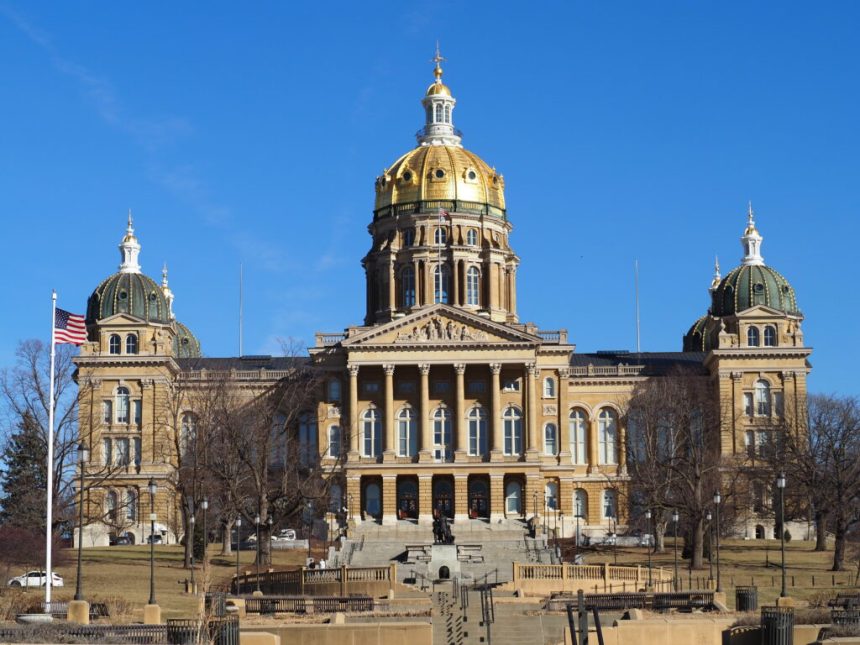The Iowa State Capitol on Jan. 29, 2025. (Photo by Robin Opsahl/Iowa Capital Dispatch)
Iowa Democrats said the impacts of President Donald Trump’s budget reconciliation law – alongside agriculture economy troubles caused by trade wars – puts the state budget in a dangerous position as the state implements income tax cuts.
The budget reconciliation bill signed into law by Trump in July included changes to the Internal Revenue Code (IRC) that Iowa adopted, as the state has rolling conformity with the IRC.
The changes made in the “One Big Beautiful Bill Act” to individual and corporate income taxes – including the changes to taxes on tips and overtime – as well as franchise taxes will result in an estimated $437.5 million decrease for Iowa’s general fund revenues in fiscal year 2026, according to initial projections from the Iowa Department of Revenue. The federal law will also cause a projected $348.4 million reduction in FY 2027 revenues.
SUBSCRIBE: GET THE MORNING HEADLINES DELIVERED TO YOUR INBOX
Gov. Kim Reynolds said in a news conference Wednesday it was important Congress passed the budget reconciliation package – “because otherwise it would have been a tremendous tax increase on hard-working Iowans” – but said the changes will have an impact on Iowa’s state budget and general fund.
Additionally, Reynolds said the state of U.S. agricultural trade will also have a major influence on Iowa’s economy. As Trump has pursued renegotiating trade deals and implementing tariffs for many countries, some farmers have expressed concerns about the impact on agricultural exports. This has been an especially large concern for soybean farmers, as China is currently not buying U.S. soybeans because of tariffs imposed by Trump. China typically buys more than half of the crop grown in the U.S. each year.
Though Reynolds acknowledged the impact of these trade negotiations, she said she supported Trump’s trade agenda and called for expanding into new international markets.
“The ag economy is really impacting our economy,” Reynolds said. “Our largest sector by GDP is advanced manufacturing — it’s directly tied to ag. And in the four years of the Biden administration, they did absolutely nothing (with agriculture trade negotiations), absolutely nothing. And our farmers are good at what they do, 10% of the nation’s food supply is produced by our farm families, and so we continue to have higher yields, and we need to find markets. And the Trump administration is working every day on trade deals that will do just that.”
When the state Revenue Estimating Conference (REC) last met in March, before the federal changes were implemented, the panel estimated Iowa would see a drop of $621 million, or 6.4%, in tax receipts in FY 2026, and a revenue decrease of $626.7 million, or 6.9%, when compared to FY 2025.
The REC estimates guided the budgeting process for Reynolds and state lawmakers this year. The approved $9.425 billion budget accounted for the state’s estimated $8.5 billion in projected revenue, in addition to drawing an estimated $917 million in funding from the state’s reserves, Taxpayer Relief Fund and budget surplus.
Reynolds and Republican lawmakers said heading into 2025, they were preparing to spend money from these reserves after they approved speeding up individual and corporate income tax cuts in 2024.
Democrats have criticized Republicans, who have a trifecta of control at the Iowa Statehouse, for drawing on one-time funds in the state’s reserves and Taxpayer Relief Fund to implement income tax cuts.
In an interview Thursday, House Minority Leader Brian Meyer said the recent projected impacts of the budget reconciliation bill and agriculture economy will add to the “fiscal death spiral” Iowa is facing. He said the reserve funds will run out in roughly three years, and that without changes to Iowa’s budgeting practices, “a lot of important programs are going to have to be cut.”
He said the reserve funds are a “Band-aid” for the state to address the impacts of recent tax cuts, but that major changes need to occur in the state’s budgeting practices in order to avoid major problems in the coming years.
“That’s all they’re doing, is putting a Band-aid on a structural deficit, a structural problem in the state of Iowa that is the Republicans’ tax cuts and the trade wars,” Meyer said. “And once you pass that, in two to three years, you’re done. There’s no money.”
Meyer said he believes getting rid of Iowa’s Education Savings Account program — the public funding mechanism for K-12 private school tuition and costs — as well as reversing “tax cuts for millionaires on the state level” made through recent income tax changes would put Iowa in a better financial position moving forward.
“If we get rid of vouchers, if we get rid of those tax cuts for millionaires on the state level, all of a sudden, the budget is somewhat in a better shape,” Meyer said. “Then, you go to the national level, and you push back on Donald Trump and Republicans in the Congress and you say, ‘These tariffs are destroying Iowa’s economy.’”
Speaking Wednesday, Reynolds said the state’s funding reserves, alongside the conservative budgeting practices she and GOP leaders in the state Legislature have maintained, has put the state in a sound position to deal with some of the economic pressures.
“We’re in a good position to weather some of the ag (economy changes) and some of the effects of the One Big Beautiful Bill,” Reynolds said. “… A lot of states are not that position.”
According to a report from Truth in Accounting, a public finance transparency nonprofit, 25 states could not cover all their financial obligations at the end of FY 2024. Iowa was one of the 25 states with a surplus of funds relative to their total costs and debts.
The next REC meeting is set for Oct. 16 at the Iowa State Capitol. Reynolds also said her office has begun the budgeting process for the next fiscal year.
“As we go through the budget process, which we’ve started on … we’re going to keep spending in check, just like I’ve done for the last six years,” Reynolds said.









